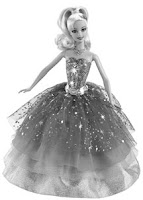I like to imagine I made a wonderful new friend yesterday, but nothing comes either cheap or easy for one of my accelerating decrepitude and iffy personality, and I had to travel far from leafy Ham to grim London EC2, to the environs of the Barbican Arts Centre, to accomplish the task. I suspect there isn’t a more charmless neighbourhood in all of Western Europe than that surrounding the BAC, in which there is no greenery, but much fervently hideous architecture — none, my new friend Anatoly (not his real name, but I’ll disclose it to those who send me $25 via Paypal) assures me, more ghastly than BAC’s brutalism, which he believes would have been right at home in Nicolae Ceausescu’s Romania.
Wishing to distance itself from a company whose iconic play figure inspired those who played with it to aspire to unattainable slenderness and vacuity, Black Sabbath changed the spelling of mattel to metal, and never looked back, except when its lead singer’s substance abuse problems compelled them to conscript a succession of surrogates lacking his weird slob charisma.
But on to Anatoly, with whom I’d exchanged messages on Facebook for some months, but never met face to face. We shared both fierce disdain for Donald J. Trump, whose closest friends call him Deeje, though he has no close friends, and affection for certain music artists. A former local hero in his native Detroit, and more recently a participant in multiple musical alliances in Boston — and in London to perform with Magnetic Fields — he had seemed at one point to like some lyrics I’d sent him to set to music, though I am of course perfectly capable of composing my own.
In person, I liked him from Moment 1. I have a great many acquaintances who are quite happy to talk about themselves ’til the cows come home, and to whom it never occurs to demonstrate reciprocal interest, but Anatoly listened attentively, and there were oceans of kindness in his eyes. We talked about everything from our mutual susceptibility to depression to basketball to our common aversion to the bogus Dust Bowl twang with which Bruce Springsteen sings if you put an acoustic guitar in his hands. He told me about a beautiful woman he’d glimpsed at a swinging nitespot in Liverpool only days before, but didn’t chat up because her false eyelashes and stylishly emphatic eyebrows suggested impenetrable vacuity.
He got my jokes. I got his. I headed back to the Tube station feeling enriched.



